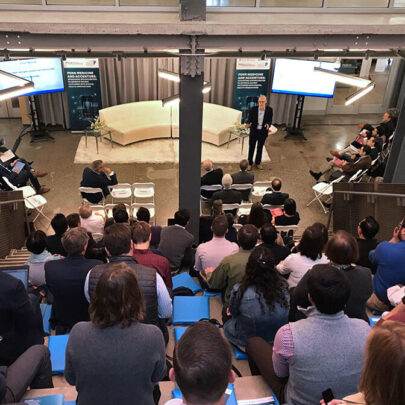Advancing Algorithmic Care: Penn Experts’ Seminar on Latest Developments
December 16, 2019
The “Advancing Algorithmic Care” event at the Pennovation Center featured experts from across Penn working in both clinical settings as well as in technology and innovation. The event, hosted by Penn and Accenture, included presentations and panel discussions on how artificial intelligence (AI) and advanced algorithms could help improve the patient experience while also reducing the complexity and cost of care.
After Roy Rosin, Penn Medicine’s Chief Innovation Officer, opened the program, Kevin Mahoney, CEO of the University of Pennsylvania Health System, spoke on the use of artificial intelligence in medicine. “I think AI is the solution to so many hand-offs, the solution to so many of those things the human mind has to recall,” he said during his welcome address.
The keynote lecture was delivered by Penn Integrates Knowledge Professor Ezekiel Emanuel, whose main message to the audience was “We must be humble,” emphasized that AI must be seen as supplementing physician care, not replacing it.
Emanuel said that the biggest problems in medicine are not a lack of data or information about patients but in using data to help change behaviors, both in patients and their caregivers. Virtual medicine and AI, Emanuel emphasized, are not something that can elicit a behavioral change on their own but can help change behaviors when used in connection with other treatments and interventions. “We need to think about how data and AI will intersect with habit formation and reward. It’s not fundamentally a data or a machine-learning problem; it’s a people problem, which is why it‘s so difficult,” he said.
Emanuel emphasized that big data and AI are not about identifying patients but in finding the right interventions and treatments while emphasizing the importance of connecting technology with things that can mitigate behavior change. “Everything you do has to be focused on how it will affect behavior change,” he said. “Data and AI can help make it easy but will not obviate the clinician or the patient-doctor relationship.

Next, Rosin shared his perspectives from his role at the Center for Health Care Innovation. Highlighting one recent effort at Penn, he discussed the early successes of “Penny,” a chatbot, that engages in text messaging with patients who are taking oral cancer medications at home. Penny helps patients adhere to their treatment regimens while also answering with questions about symptoms or side effects. Patients said they were very satisfied with the service and felt better connected to their health care providers, and clinicians could use the information to better track how patients were doing outside the clinic.
While AI and data science have great potential for impact in health care, Rosin added that the process of getting automation and analytics right had to be “rigorous.”
“It’s not just that you get an algorithm and turn it on,” he added. “Using AI, we can achieve value but only with contextual insight, workflow integration, and a lot of iteration.”
Then, Ken Munie, Global Life Sciences Strategy Lead at Accenture, discussed digital health and the ongoing partnership with Penn Medicine to develop more digital therapeutics. “We can help the life sciences better understand disease, perhaps even diverting some of their scientific knowledge into driving digital solutions in addition to therapeutics,” he said, emphasizing the importance of having health care providers see digital health technology development as a worthwhile investment.

Mark Turco of the Penn Center for Innovation led the first panel on how virtual platforms can improve patient-care quality and satisfaction, reduce cost, and benefit patients’ overall health. Clinicians Kathleen Lee, Kirstin E. Leitner, and John C. Kucharczuk; pharmacist Christine Cambareri; and bioinformaticist Jason Moore, all with Penn Medicine and the Perelman School of Medicine, shared their experiences on how AI and algorithms have been used in their practice and the challenges they’ll face in the coming years, like integrating information coming in through chat bots into electronic medical records.

The second panel, led by Justin Bekelman, Director of the Penn Center for Cancer Care Innovation (PC3I) and Associate Professor of Radiation Oncology at the Hospital of the University of Pennsylvania, focused on stakeholder needs and expectations. The panelists, including Penn expert Lawrence Shulman, explained that the value of implementing things like Penny must be measured, first and foremost, by whether they improve patients’ lives.
To close the program. Rosin returned to the question of when AI will become fully realized in the health care system. “When people think in terms of, ‘When do you think this will be real?’ I think it depends on how you consider the question,” he said. “I think some of it is real today.”


